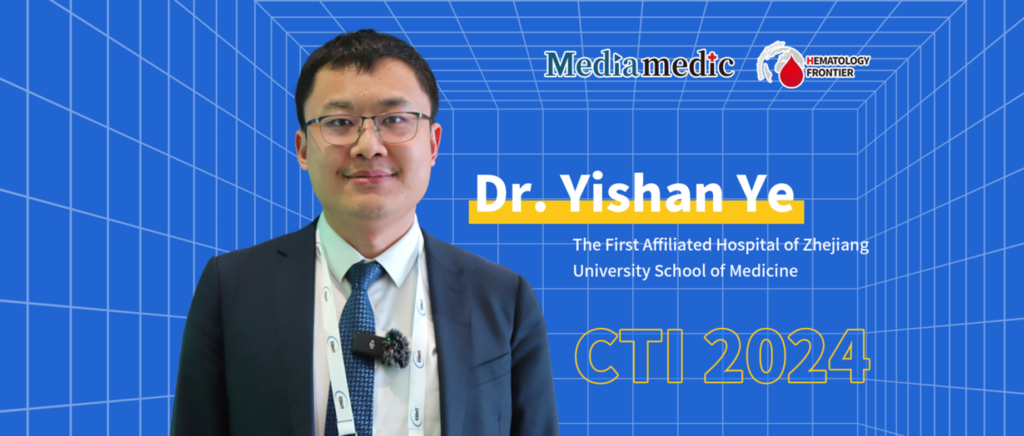
From November 14 to 17, 2024, the Cellular Therapy and Immunotherapy Conference (CTI) was held in Hangzhou, China, attracting leading experts, scholars, and industry leaders in cellular and immune therapies. This international platform not only fosters academic exchange but also showcases the latest research breakthroughs and drives progress in the field. During the conference, Dr. Yishan Ye from The First Affiliated Hospital of Zhejiang University School of Medicine shared his insights in an interview with Hematology Frontier. He discussed the principles of donor selection in allogeneic hematopoietic stem cell transplantation (allo-HCT) and the findings from the EBMT-China collaboration. Here is the interview in full.Hematology Frontier: According to the latest results from the EBMT-China collaboration, what general principles of donor selection in allo-HCT have changed? What key factors should be considered during donor selection?
Dr. Yishan Ye: In recent years, significant progress has been made in the field of donor selection. In our recent collaboration between The First Affiliated Hospital of Zhejiang University School of Medicine and the European Society for Blood and Marrow Transplantation (EBMT), we observed a major finding: for high-risk acute myeloid leukemia (AML) patients, haploidentical donors showed unique advantages in reducing disease relapse rates compared to traditionally preferred fully matched related donors. However, the road ahead remains long and challenging. We must explore ways to further reduce post-transplant complications, ultimately translating the relapse-reducing advantage of haploidentical transplantation into a survival benefit. This could make haploidentical transplantation a superior donor option in specific scenarios, such as high-risk AML treatment.
We have also explored transplantation using collateral relatives as donors, achieving outcomes comparable to those from direct relatives. This finding significantly broadens the range of potential donors. These two directions will remain focal points for further exploration and research.
Hematology Frontier: In the allo-HCT field, how do you view the differences between China and Western countries in donor selection and transplantation practices?
Dr. Yishan Ye: China is at the forefront of haploidentical transplantation technology worldwide. We started early and have achieved remarkable results. There is a clear difference in donor availability between China and the West. Internationally, finding suitable hematopoietic stem cell donors is relatively easier. However, in China, we face a more challenging donor shortage. This scarcity led us to adopt haploidentical transplantation as a unique technical approach, and through persistent effort, we have achieved outstanding success.
Haploidentical transplantation has become a hallmark of China’s medical achievements compared to Western countries. We should continue to innovate, optimize, and refine various aspects of haploidentical transplantation to further enhance its efficacy and safety, making it stronger and better for patient care.
Hematology Frontier: Looking ahead, what new trends do you foresee in donor selection for allo-HCT? How will the EBMT-China collaboration further advance this field?
Dr. Yishan Ye: In the field of donor selection for hematopoietic stem cell transplantation, two key challenges stand out. First, expanding the donor pool effectively. As I mentioned, collateral relative and haploidentical transplantation techniques are continuously advancing and can significantly broaden donor options. Second, optimizing donor selection strategies. Together with domestic colleagues, we will conduct further in-depth research to explore the best donor strategies for different types of leukemia or other hematologic malignancies, with the goal of benefiting more patients. In the future, we hope to see increasingly personalized donor selection approaches, moving toward the vision of “everyone has not just a donor, but the best donor.”
The EBMT-China collaboration will continue to play a critical role in enhancing the overall level of hematopoietic stem cell transplantation in China. This partnership is of great significance for advancing the treatment of hematologic diseases. We also plan to work with more domestic medical institutions and expand our collaboration with the EBMT to encompass broader areas of hematology and various diseases, further increasing the international influence of China’s hematology field.
Outlook
Dr. Yishan Ye’s insights highlight the critical progress and future potential in donor selection and transplantation practices, particularly in haploidentical transplantation. The EBMT-China collaboration is paving the way for new advancements, expanding donor pools, and refining strategies to improve outcomes for patients. This partnership is poised to elevate the global standards of hematopoietic stem cell transplantation and further solidify China’s leadership in hematology research and practice.


